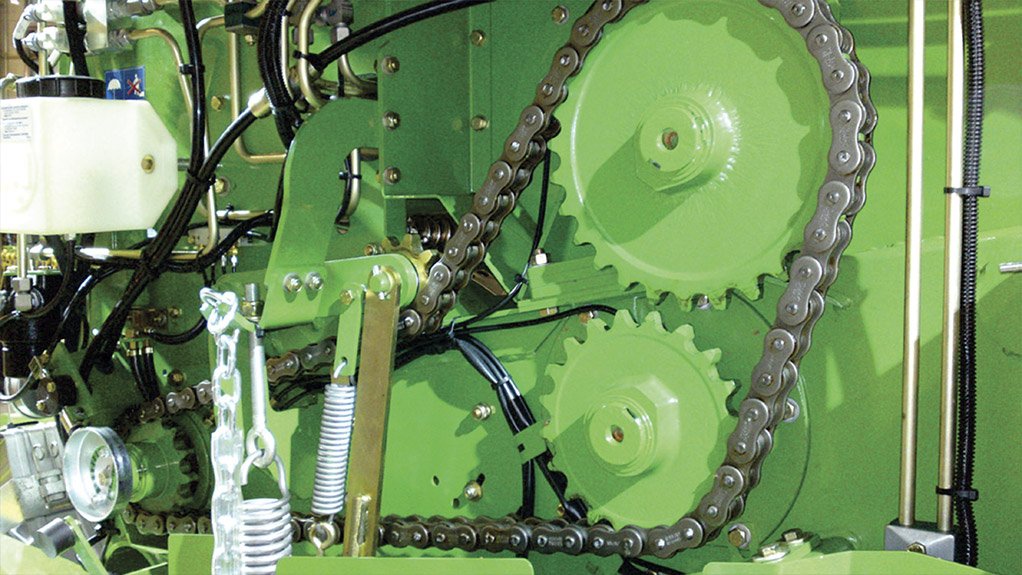
+27 (0)11 620 1500
Droste Crescent, Jeppestown, Johannesburg 2043, South Africa

Supplier provides quality equipment for optimum productivity


TOUGH CONDITIONS BMG supplies Tsubaki RS100HT heavy-duty reinforced roller chain to meet the high-volume capacity of agricultural machinery in tough operating conditions
Industrial equipment supplier BMG’s service to the agriculture sector focuses on the importance of investing in quality equipment and components for high efficiencies and optimum productivity across all farming disciplines.
“The highly-experienced BMG team offers farming sustainability solutions that focus on the correct use of suitable equipment for the specific task and the efficient application of advanced technologies,” explains BMG national Tsubaki product specialist Gavin Kirstein.
He adds that through the Boer Slim/Smart Farming concept, BMG’s agricultural experts work closely with farmers, to help them cope with constantly changing trends in agricultural machinery.
“A recent success in agricultural engineering for one of our key Japanese suppliers – Tsubaki – was solving the chain breakage problems on harvesters, as a result of excessive shock-loads in the field.”
Kirstein notes that during the harvest season, it is essential that round balers operate efficiently to ensure maximum yield for the farmer.
He warns that shock loads during baling weaken an inferior chain, which can lead to unacceptable stoppages for farmers who are working to tight deadlines. The pressing process also exposes chain to extreme forces, which conventional chain cannot withstand for an entire season.
“Farmers have been unhappy with the loss of productivity during the downtime of their balers and they resent chain replacement costs.”
Tsubaki’s solution was to develop a heavy-duty reinforced roller chain to meet the high-volume capacity of agricultural machinery in tough operating conditions, with no risk of breakage during operation, explains Kirstein. The robust Tsubaki RS100HT chain for balers has a 25% higher maximum tensile strength, improved anti-shock performance and greater fatigue strength, when compared to chain manufactured by other companies.
About 70% of global baler manufacturers now choose the Tsubaki heavy-duty chain series as standard for installation in the main drive system.
“Feedback from farmers indicates that they are satisfied with higher productivity, reduced maintenance requirements and reliability throughout the season, with no loss of production from downtime.”
A further benefit, is that heavy-duty Tsubaki chain can also prepare perfect bales, as these chains are suited to the high pre-tension settings required to allow easy storage and shaping of hay, he adds.
The Tsubaki HT series chain provides a significantly higher tensile strength than the ANSI G8 series chain, by applying through-hardened pins and link plates of the next larger pitch size in the ANSI G8 series.
Compared to the previous series, the wear-life of the HT Series is doubled by using solid bushes instead of curled bushes. The HT series chain also provides a higher fatigue strength and is best suited for low operating speeds up to 50 m a minute.
He adds that the dimensions of the chain are identical to the H Series chain.
BMG’s range of high-quality replacement agricultural components is engineered to improve productivity in the farming sector, to operate efficiently for extended periods with minimal maintenance requirements and to reduce costs in the long term.
Additionally, new to the company’s range are slogging hammers and wheel sloggers, used to loosen and tighten bolts and nuts quickly and easily; bearing products and components supplier BTC gearboxes, designed specifically for packhouses; and Motoline solar inverters for photovoltaic water pumps. Dual direction multi-purpose gearboxes, power take off clutches and components and heavy-duty coulter bearings have also been launched recently.
The company provides solutions to all key players in the agricultural sector, including local manufacturers of equipment and implements, as well as agricultural resellers and the farmer, concludes Kirstein.


